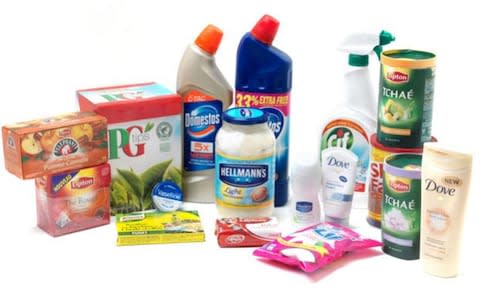Unilever says it is 'extremely unlikely' to be in FTSE after headquarters shift

UK shareholders in Unilever may be forced to sell their stakes after the company indicated it would leave the FTSE series of indices when it switches from an Anglo-Dutch structure in favour of a single headquarters in Rotterdam.
In a presentation delivered at the Deutsche Bank Conference in Paris today, the company - which makes Persil, Dove soap and Ben & Jerry’s ice cream - said it had “deep engagement” with FTSE Russell, but that it was “extremely unlikely to be included in FTSE UK series”.
Unilever is currently one of the biggest components of the FTSE 100, with a valuation of £48.8bn.
Once the company shifts its headquarters to Rotterdam, it would be more likely to increase its weighting in Europe's blue-chip index EuroStoxx.
Graeme Pitkethly, chief financial officer, said: “We’ve been engaging extensively with FTSE Russell over the last few weeks and months and from this it is clear that it is extremely unlikely that the ‘New NV’ shares after simplification will be included in the FTSE UK series.
“We will be maintaining a premium listing in London and we would hope those investors who are impacted have sufficient flexibility in their portfolios to continue to hold Unilever.”
Unilever share price
The news will come as a blow to the company and many of its UK shareholders.
As recently as March, the group said nearly all of its 7,300 UK workers would remain in the country and that it would continue to be listed in London and New York as well as Amsterdam. While the company will continue to trade shares in London, the change means that investors in funds that track the FTSE 100 may be forced to ditch the company's shares.
According to Laith Khalaf of Hargreaves Lansdown, Unilever's departure from the FTSE All Share Index will mean that UK tracker funds, as well as "benchmark aware" funds, will most likely have to sell their holdings. European tracker funds may increase their exposure to the company through the European index.
"UK active managers have more leeway to hold onto it if they want to... even if it's not in the FTSE 100," he said.
London-listed shares in Unilever were down 3.57pc in early trade at £40.02.
Mr Khalaf said disgruntled shareholders may push back on the company's plans when it comes to voting on it at the extraordinary general meeting in the third quarter of the year.

"There's an interesting dynamic about whether this announcement and, of course, the share price fall on the back of it might actually encourage more people to think 'should I actually vote against this move?' Because in the short term at least it could lead to a positive fillip to the share price."
In March a top 10 Unilever shareholder, Columbia Threadneedle Investments, said: "Given the potential implications and need for 75pc approval, they need to do more to convince UK shareholders of the merits of the move."
The company currently has 1.2 billion shares listed in London, 1.7 billion in Amsterdam and 1.7 billion in New York. It does not plan to reduce the number of London-listed shares.
Unilever has had its unusual corporate structure since it was created in 1930 by a merger of Britain’s Lever Brothers and the Dutch company Margarine Unie. The company plans to implement the headquarters switch by the end of the year.
Its departure from the UK blue-chip index would open up a space for a new, "much smaller" entrant and would mean that the other companies in the index would need to be re-weighted, Mr Khalaf said.
But he added: "Ultimately what we're seeing here is not affecting the business [or] people's propensity to buy Unilever products around the globe."

 Yahoo Finance
Yahoo Finance 